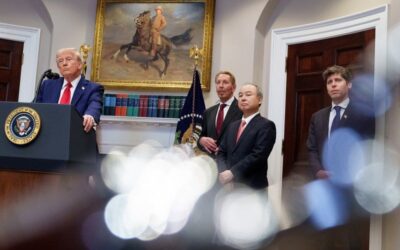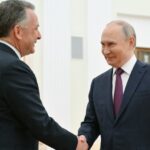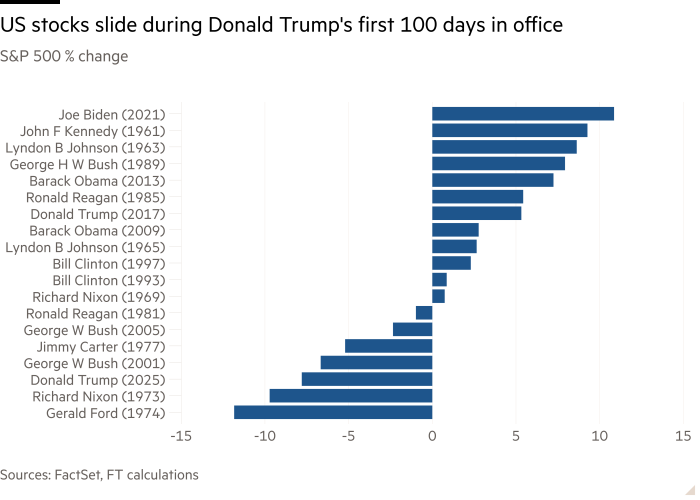Canada’s Carney prepares to take the west’s anti-Trump mantle
In the end, Canada’s election was as much about the man in the White House as the one who would be prime minister in Ottawa.
The margin was thin, but the verdict from Canadians was clear. With President Donald Trump’s tariffs threatening the foundations of their economy, voters wanted Canada’s leader to be the central banker who navigated the global financial crisis and Brexit.
Mark Carney, who until Monday evening was not even a member of parliament, is now on track to lead a minority government with a mandate to confront Trump. He has promised a “broad renegotiation of our security and trade relationship” with the US, Canada’s closest ally and largest trading partner.
“We are once again at one of those hinge moments of history,” Carney told jubilant supporters at a victory rally in Ottawa. “Our old relationship with the US, one based on steady integration, is over.”
The “American betrayal” was a tragedy, Carney said, “but it is also our new reality”.
“America wants our land, our resources, our water, our country. These are not idle threats.”
After almost a decade of Justin Trudeau’s progressive politics, Carney moved the Liberal party decisively towards the centre, and put Canadian sovereignty and opposition to Trump — who has threatened to annex the country — at the core of his pitch to voters.
“It was a very serious election and these issues were almost existential,” Jean Chrétien, Canada’s Liberal prime minister from 1993 to 2003, told the Financial Times. “Mr Carney has a mandate that is clear, the Canadians want him to stand up to the threat that is Mr Trump,” he said.
Carney’s win will resonate well beyond Canada, especially in western capitals and global boardrooms where the former Goldman Sachs executive is already a known quantity — and now becomes a strong figure among world leaders prepared to stand up to Trump.
Sandro Gozi, an Italian politician who led Europe’s liberal parties in EU elections last year, said Carney’s win was “the first victory of democracy against a new and unacceptable imperialistic and bullish action from Washington”.
“It can inspire other countries,” said Gozi. “The victory of Carney is of the utmost importance. Not only for Canada but for all the democrats around the world.”
Carney’s campaign capitalised on a groundswell of patriotism as Canadians balked at Trump’s taunts and tariffs, pulling Napa Valley wine from liquor store shelves and booing the American national anthem at ice hockey games.
As of the early hours of Tuesday morning, the Liberals were on track to win 168 seats in the 343-seat House of Commons, well ahead of the Conservatives at 144 seats but short of a majority.
A minority government would present challenges for Carney. His first priority must be to negotiate a voting deal with a partner such as the New Democratic party, leaving his premiership in a holding pattern for now.
The NDP, which also supported Trudeau’s previous government, was on track to win seven seats. Though its leader Jagmeet Singh resigned after failing to win his seat, the leftwing party would have the balance of power and could hold Carney to ransom on policy and legislation.

The US president’s looming presence in the election hurt Conservative party leader Pierre Poilievre, who had enjoyed a huge lead in the polls until the beginning of the year and was on track to lose his seat, according to CBC.
The reversal of Poilievre’s fortunes will be closely watched by other rightwing parties, which may now be more leery of close association with Trump.
Even as Canadians went to the polls on Monday, Trump was urging voters to elect a leader who would make the country the US’s 51st state as “it was meant to be”. One adviser to Carney said Trump’s intervention was a “gift” to the former central banker.
“Mark Carney and I were in school together,” US representative for Connecticut Jim Himes said on X in response to Trump’s message. “If I had said to him, ‘Mark, someday Donald Trump will be President of the United States, and he is single-handedly going to make you Prime Minister of Canada,’ he would have called campus security to take me home.”
Carney is set to host the G7 summit in Kananaskis, Alberta province in June at a particularly tense time between world leaders with Trump expected to travel to Canada.
Trump’s return to the White House in January came just a couple of weeks after Trudeau stepped down as Liberal leader after nearly a decade in power.

Carney, who replaced Trudeau at the helm of the Liberal party in March, made his mark quickly, scrapping an unpopular carbon tax that had been one of Poilievre’s main lines of attack on the Liberals.
Trump’s trade war, which began with sweeping tariff threats against Canada and Mexico, proved to be an opportunity for Carney.
A former goalkeeper for the Harvard and Oxford university hockey teams, Carney referenced an aggressive stance on the ice in response to Trump with the slogan: “Elbows up, Canada.”
Chrétien praised Carney’s performance on the campaign trail. “He remained calm and in control, for a newcomer he was performing extremely well,” he said.
Carney has promised to make Canada the “strongest economy in the G7”, although many voters have been frustrated by the pace of growth.
The novice politician, who spent a three-decade career on Wall Street and running central banks, will now have to negotiate with Trump and steer Canada’s economy through a global trade war.
He has promised to reduce Canada’s significant internal trade barriers, and form new trade alliances in Asia and Europe to diversify Canada’s economy away from an over-reliance on the US.

Managing the economy through this transition after decades of deep integration with the US will be a challenge.
“The public is behind him now, but political support tends to be a diminishing resource,” said Roland Paris, a professor at the University of Ottawa and former adviser to Trudeau. “Many of Carney’s pledges will require years of concerted effort to realise.”
Carney will have to try to preserve Canada’s automotive sector, which is threatened by tariffs, as well as boost productivity and balance increased resource exports with environmental concerns, Paris added.
Janice Stein, founding director of Toronto’s Munk School of Global Affairs and Public Policy, said anger and fear drove Canadians to vote for Carney, but his pugnacious campaign could lead to difficulties in government.
“Leading the ‘rebels’ against the US is a role that no Canadian prime minister can afford to play,” she said, given the economy’s ties to America and the integration of the countries’ supply chains. “Divorce is simply not possible.”





